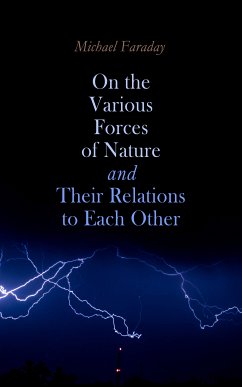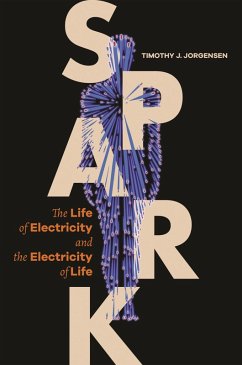
On the Various Forces of Nature and Their Relations to Each Other (eBook, ePUB)

PAYBACK Punkte
0 °P sammeln!
In "On the Various Forces of Nature and Their Relations to Each Other," Michael Faraday offers a groundbreaking exploration of the interconnectedness of natural forces, such as electricity, magnetism, and gravity. Faraday's clear and accessible prose effectively communicates complex scientific concepts, making them understandable to readers both familiar and unfamiliar with the subject matter. His text is not only a significant scientific treatise of the 19th century but also a pivotal point in the evolution of scientific thought, bridging the gap between classical physics and the emerging the...
In "On the Various Forces of Nature and Their Relations to Each Other," Michael Faraday offers a groundbreaking exploration of the interconnectedness of natural forces, such as electricity, magnetism, and gravity. Faraday's clear and accessible prose effectively communicates complex scientific concepts, making them understandable to readers both familiar and unfamiliar with the subject matter. His text is not only a significant scientific treatise of the 19th century but also a pivotal point in the evolution of scientific thought, bridging the gap between classical physics and the emerging theories of modern science. Through meticulous experimentation and keen observation, Faraday elucidates the principles underlying various natural forces, underscoring their interrelations and implications for understanding the physical world. Born in 1791, Michael Faraday was a self-taught scientist whose humble beginnings as a bookbinder instilled in him a profound appreciation for knowledge and innovation. His relentless curiosity and intensive research contributed to significant advancements in electromagnetism and electrochemistry. Faraday's experiences working alongside eminent scientists, including Humphry Davy, deeply influenced his perspective on experimental science, leading to the development of key concepts presented in this text. This seminal work is essential for anyone interested in the foundations of physical science or the relationship between various forces in nature. Faraday's insights remain highly relevant, making "On the Various Forces of Nature and Their Relations to Each Other" a crucial addition to both academic libraries and personal collections, as it invites readers to reflect on the principles that govern our universe.
Dieser Download kann aus rechtlichen Gründen nur mit Rechnungsadresse in A, B, BG, CY, CZ, D, DK, EW, E, FIN, F, GR, HR, H, IRL, I, LT, L, LR, M, NL, PL, P, R, S, SLO, SK ausgeliefert werden.













